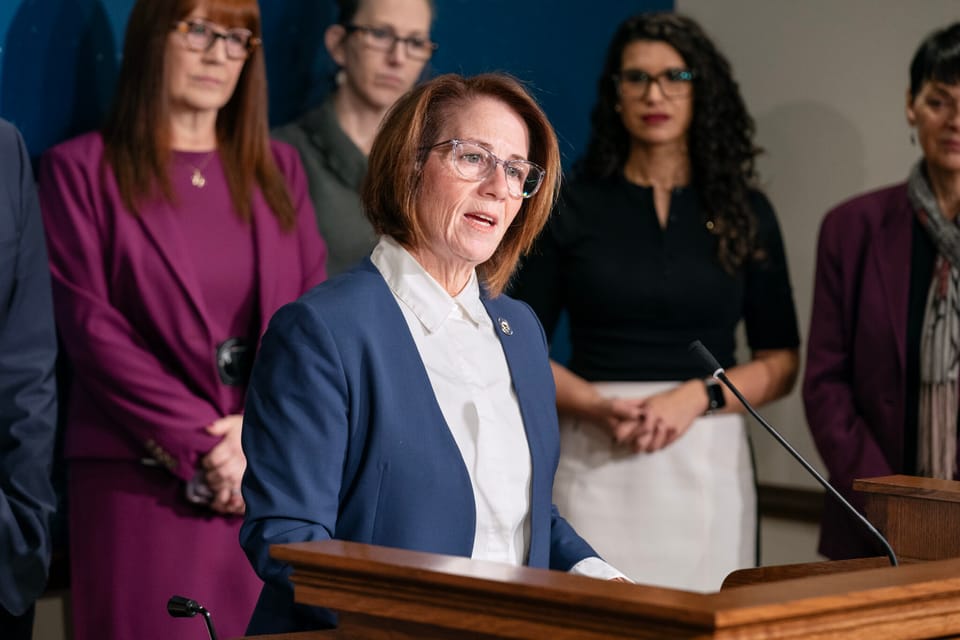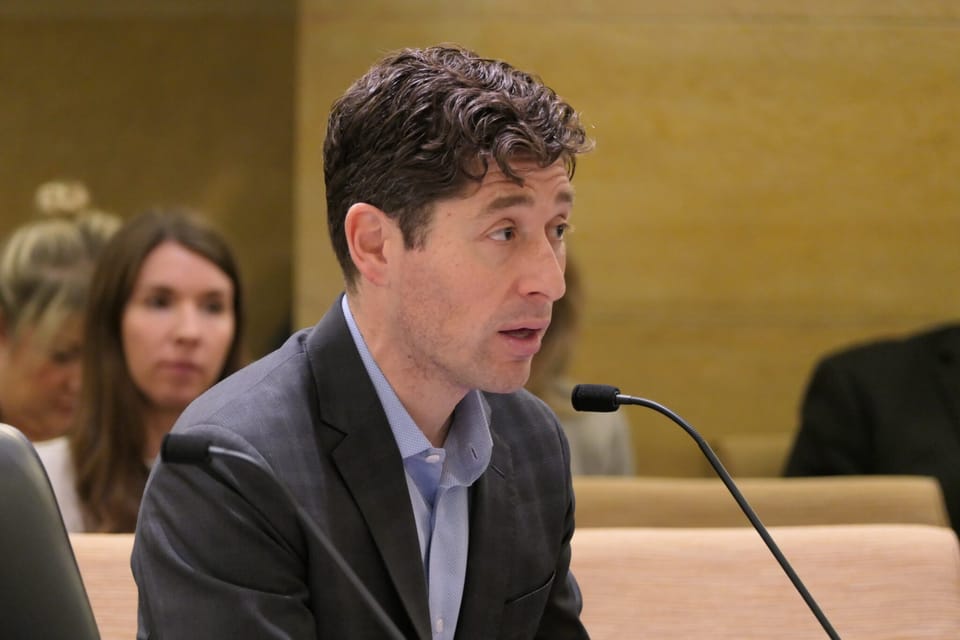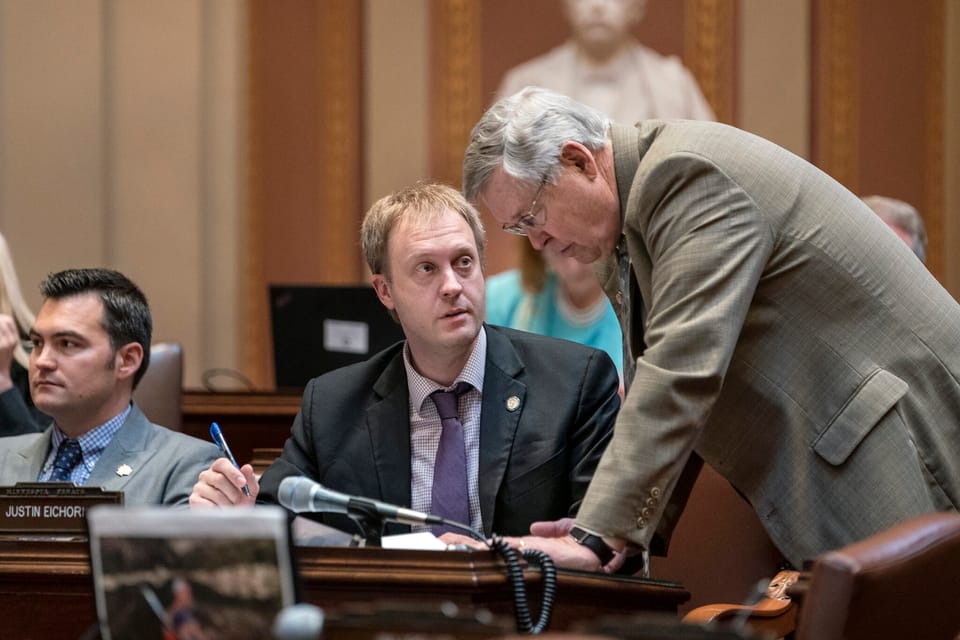Here’s what labor policy bills will likely pass in Minnesota — and other labor news

By Max Nesterak, Minnesota Reformer
Take a seat in the Break Room, our weekly roundup of labor news in Minnesota and beyond. This week: Minnesota’s labor policy package; AG gets temporary injunction for dairy farm workers; Nonprofit hospitals get more than they give; law enforcement’s recruitment crisis; Amazon drivers are employees in Wisconsin; Carnival operator ordered to pay back wages; unions were among top lobbying spenders; and UMD faculty reach tentative agreement.
The labor policy agenda
Minnesota Democratic lawmakers passed a sweeping package of worker-friendly legislation last year, and have a smaller agenda this session. They’ve have combined the labor policies they plan to pass this year in large omnibus bills (HF3947/SF3852) which include:
Minimum wage standardized (HF4050/SF3947): Virtually all employees would be entitled to the state’s current minimum wage for large employers of $10.85 an hour. The lower minimum wage of $8.85 an hour would be eliminated for small businesses, employees under 18 years old and foreign workers on J visas in the hospitality industry.
Salary range disclosure (HF3587/SF3725): Employers would have to include salary ranges in job postings along with a general description of benefits and other compensation.
Pregnancy accommodations (HF4286/SF4384): Employers must maintain health insurance coverage for employees and their dependents during any required period of leave for pregnancy so long as the employees pay their share of the costs.
Tips (HF4787/SF4709): Employers may not deduct transaction fees from gratuities made with a credit card or other form of electronic payment.
Captive audience meetings poster (HF3442/SF3495): The Department of Labor and Industry must create an educational poster to inform employees that they can’t be forced to attend anti-union meetings or other employer-sponsored meetings on religious or political matters. The Legislature banned so-called captive audience meetings last year.
Ban on shadow noncompetes (HF3456/SF3721): Contracts between businesses and customers that restrict workers’ employment choices would be banned. For example, child care centers would not be allowed to prohibit parents from hiring their teachers, and property maintenance companies would not be allowed to prohibit homeowners associations from hiring their workers.
There are other labor bills the Legislature is expected to pass before adjourning in May. Lawmakers are expected to pass a public works (“bonding”) bill to fund improvements to roads, bridges and other public infrastructure.
Bills that will have an impact on the state budget — like increasing penalties for misclassification (HF4444/SF4483) or allowing striking workers to collect unemployment benefits (HF3446/SF3588) — will be considered as lawmakers put together large budget bills later on.
Lawmakers are also working on a bill (HF4569/SF4593) aimed at preventing subcontractors with histories of labor violations from working on affordable housing projects; a bill (HF4508/SF4597) that would allow University of Minnesota undergraduate students to unionize; and a bill (HF3488/SF3496) guaranteeing underage social media influencers receive a share of compensation from their revenue-generating accounts.
Minimum pay rates and labor protections for Uber and Lyft drivers are still on the table, too. Lawmakers, driver advocates and the companies continue to negotiate behind the scenes to try to find pay rates that all sides can live with. The House version of the bill (HF4746/SF4780) still doesn’t have proposed minimum pay rates, while in the upper chamber, Sen. Omar Fateh, DFL-Minneapolis, proposed rates higher than those supported by a state analysis of more than 18 million trips taken in the state in 2022.
A public option bill (HF4745/SF4778) that would expand MinnesotaCare to people without affordable health insurance from their employers faces resistance within the Democratic caucuses. Gov. Tim Walz’s office said he doesn’t want to create a costly public program in a non-budget year, while other Democratic lawmakers have expressed reservations about such a significant increase in public spending for a relatively small share of the state’s population without checks on health care costs.
Evergreen Acres injunction
Minnesota Attorney General Keith Ellison’s office announced this week they secured a temporary injunction in their lawsuit against a central Minnesota dairy operation they’ve accused of stealing more than $3 million in wages from hundreds of workers, while illegally charging them for squalid living quarters.
As part of the agreement, Evergreen Acres Dairy agreed to keep proper records of employee hours; give workers clear written notice of their wages; stop charging rent for substandard housing; pay for a housing inspector to document any housing code violations; and allow re-inspection of worker housing to confirm safety issues were addressed.
The owners of Evergreen Acres Dairy and its related companies, which operate 18 facilities, have denied all allegations in a court filing. The first hearing in the case is scheduled for April 19.
Minnesota hospitals’ ‘fair share’ deficits
Ninety percent of Minnesota’s nonprofit hospitals receive more in tax breaks than they spend on charity care and community spending, adding up to a $1.1 billion loss for Minnesota residents, according to a new national report from the Lown Institute.
Nonprofit hospitals are exempted from a slew of taxes with the understanding those savings will be passed on to the public through patient financial assistance, health education and community grants. Four of Minnesota’s largest systems — Mayo Clinic, Allina, Fairview and HealthPartners — have “fair share” deficits greater than $100 million, according to the report.
Mayo Clinic’s flagship Rochester hospital ranked in the top 10 hospitals with the largest deficits at $165 million. Across its operations in four states and 18 hospitals, Mayo Clinic received about $478 million more in tax breaks than it spent on community benefit programs, according to the Lown Institute.
Hospital groups blasted the report as unfair because it doesn’t account for hospital spending on research, training medical staff and covering the shortfall between Medicaid reimbursement rates and the cost of caring for those patients.
The Minnesota Nurses Association, the union representing about 22,000 nurses, is pushing legislation at the state Capitol (HF4870/SF4948) that would set stricter standards on hospital spending earmarked for the public’s benefit. The union says hospitals are currently able to unfairly count some spending as serving a community benefit — like billboards with the health systems’ logos that hospitals say promote public health education, for example.
The nurses’ union is also lobbying Minnesota lawmakers to request an audit of nonprofit community benefit spending.
Law enforcement’s recruitment problem
Virtually all Minnesota law enforcement officers are worried about recruitment and retention while the vast majority are unlikely to recommend the profession, according to a survey of 1,241 members of the Minnesota Police and Peace Officers Association.
The survey found 98% said they are somewhat, very or extremely concerned about recruitment and retention, as well as the risk of prosecution for on-duty actions. Eighty percent said they are unlikely or very unlikely to recommend the profession to a son or daughter.
“Minnesota’s law enforcement profession is in both a morale and recruitment and retention crisis,” said MPPOA Executive Director Brian Peters in a statement. “Police want the law consistently applied to offenders, less bias headlines, and less reckless political rhetoric.”
The survey comes as law enforcement and their allies are pressuring Gov. Tim Walz to reassign a murder case brought by Hennepin County Attorney Mary Moriarty against state trooper Ryan Londregan in the fatal shooting of Ricky Cobb II last July during a traffic stop.
Law enforcement agencies across the country have been struggling with a “historic crisis” in recruiting and retaining enough officers to replace those who retire or resign, according to a 2023 U.S. Department of Justice report, which cited policing’s poor public image as one significant barrier.
Since the police murder of George Floyd in 2020, the Minneapolis Police Department has seen its ranks fall from nearly 900 to 565.
Amazon drivers are employees in Wisconsin
The Wisconsin Supreme Court let stand a lower court’s ruling that delivery drivers in the Amazon Flex program are employees, not independent contractors, as an Amazon subsidiary argued, the Associated Press reported. The high court’s dismissal of Amazon Logistics’ appeal means the company will likely be on the hook to pay the state more than $200,000 in back unemployment insurance premiums.
Wisconsin labor regulators brought the case against Amazon Logistics after one worker was fired from Amazon Flex and filed for unemployment insurance; a state audit of more than 1,000 drivers concluded the vast majority were misclassified as independent contractors.
States across the country are contending with how to respond to tech giants like Amazon, Uber and Lyft relying on gig workers to run daily operations. The set-up entices workers with flexibility and independence while allowing the companies to sidestep labor protections afforded other workers like unemployment benefits, overtime pay, minimum wages, sick leave and workers compensation.
In Minnesota, a recent legislative audit found the state’s response to misclassification is “uncoordinated and inadequate.” Democratic lawmakers are moving forward with fixes. Meanwhile, state lawmakers are determined to set minimum pay rates and labor protections for Uber and Lyft drivers, without explicitly declaring them either employees or independent contractors. That allows the companies to continue treating drivers as independent contractors while leaving opening the possibility for a legal challenge down the road.
Carnival operator must pay $210K in back wages
A U.S. Department of Labor judge ordered Fairbault-based GoldStar Amusements and Lee Concessions to pay 55 employees back wages totaling $146,243 plus $63,584 in civil penalties. The decision affirms an investigation by federal labor regulators that found the companies, which operate amusement rides and provide food and games at carnivals, shorted workers during their 2016 and 2017 seasons. According to the ruling, owners Michael and Connie Featherston didn’t pay prevailing wages, pay for transportation costs or keep accurate earning statements as required for the workers they hired through the H-2B visa program, which authorizes foreign workers to do seasonal, non-agricultural work. The Featherstons disagree with the ruling and plan to appeal, their attorney told the Star Tribune.
The case, which goes back nearly eight years, underscores the delay workers face when they are the victims of labor law violations.
Unions among biggest spenders on lobbying
Two unions — Education Minnesota and LIUNA — were among the six organizations that spent more than $1 million on lobbying Minnesota state lawmakers, state agencies, utility regulators and metro governments in 2023, according to the Campaign Finance and Public Disclosure Board and first reported by the Star Tribune’s Jessie Van Berkel. With a historic $17.5 billion surplus on the line last year and Democrats in control of state government, interest groups spent a record-setting $96 million on lobbying.
Education Minnesota spent $1.6 million influencing policymakers. They were the third biggest spender behind Xcel Energy ($1.97 million) and the Minnesota Chamber of Commerce ($1.85 million). LIUNA, the trade union representing construction and energy workers, spent $1.1 million. Other high-spending labor groups included AFSCME Council 5 ($570,000), MN AFL-CIO ($497,381), and International Union of Operating Engineers Local 49 ($305,500).
UMD faculty reach tentative agreement
Union leaders for the faculty of the University of Minnesota-Duluth reached a tentative agreement with the university earlier this month, and members will vote on the contract next week, the Duluth News Tribune reported. The deal includes a 3.75% raise across the board, plus promotion adjustments, and additional raises aligned with the rest of the University of Minnesota system. Left unresolved is the issue of teaching workloads, which the university wants to increase while faculty want to preserve time for research.
Minnesota Reformer is part of States Newsroom, a nonprofit news network supported by grants and a coalition of donors as a 501c(3) public charity. Minnesota Reformer maintains editorial independence. Contact Editor J. Patrick Coolican for questions: info@minnesotareformer.com. Follow Minnesota Reformer on Facebook and Twitter.



